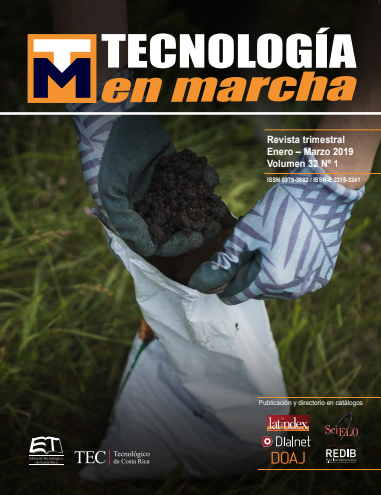Recovery of solid waste at Costa Rica Institute of Technology 15 years after the creation of the permanent activity Institutional Waste Management MADI
Main Article Content
Abstract
An analysis of the generation of the waste produced at the Central Campus of the Costa Rica Institute of Technology was carried out, both, for the materials recovered by the Institutional Collection Center (MADI), as well as for the waste sent to the landfill. The amounts of the recoverable materials were provided by MADI. Literature references were used to count the quantities of organic waste from the Institutional Restaurant. The amount of waste sent to the landfill were obtained through a composition study during the first semester of 2013 and 2014, based on the methodology recommended by the Costa Rica Ministry of Health (MINSA). The waste types of this methodology were simplified into three categories: recoverable, compostable and non-recoverable. 50 % of the transfer stations of waste sent to landfill were chosen. The composition study was carried out on samples that varied between 23.3 and 73.4 % of the total mass of waste from the chosen transfer stations. It was found that from the total waste sent to the landfill (60 ± 1) % were not recoverable, while (29 ± 2) % and (12 ± 1) % were recoverable by MADI or compostable, respectively. For 2015, MADI recovered 63% of the total waste with recyclable potential of the total institutional waste stream, and the Restaurant 66% of total food waste. However, the institute must work on a strategy that can improve the performance of the integral management of institutional solid waste.
Article Details
Los autores conservan los derechos de autor y ceden a la revista el derecho de la primera publicación y pueda editarlo, reproducirlo, distribuirlo, exhibirlo y comunicarlo en el país y en el extranjero mediante medios impresos y electrónicos. Asimismo, asumen el compromiso sobre cualquier litigio o reclamación relacionada con derechos de propiedad intelectual, exonerando de responsabilidad a la Editorial Tecnológica de Costa Rica. Además, se establece que los autores pueden realizar otros acuerdos contractuales independientes y adicionales para la distribución no exclusiva de la versión del artículo publicado en esta revista (p. ej., incluirlo en un repositorio institucional o publicarlo en un libro) siempre que indiquen claramente que el trabajo se publicó por primera vez en esta revista.

